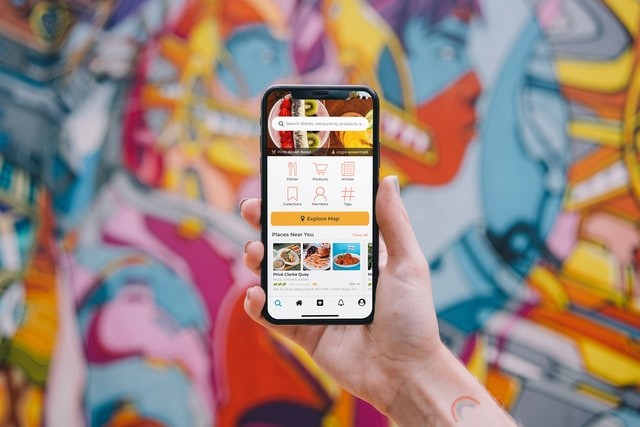Back when the internet was just taking its first steps, having a website wasn't something most businesses could afford. Now, that isn't something outlandish - it's a prerequisite to success. Without a website, you simply don't exist in the eyes of consumers.
The same used to apply to mobile apps 10-15 years ago. Smartphones weren't in everyone's pocket yet, and the mobile internet was expensive. So, it just didn't make sense for small business owners to invest hundreds of thousands of dollars into mobile app development.
Now, however, things have changed. First, the development costs have become more affordable - so affordable that even small businesses can afford to get a custom mobile app today. Second, smartphone use is on the rise. On average, users spend 4 hours 23 minutes on their phones a day - and that's excluding calls.
So, turning to a custom mobile app development company isn't something reserved for large corporations only anymore, nor is a mobile app just a nice-to-have addition to your branding strategy. It's a fairly accessible marketing tool that can benefit you in the following 5 ways.

1. It'll Facilitate the Customer Journey
Let's say you run a restaurant. If you stick to your old-fashioned guns, your customers will have to call in to reserve a table. Once they're there, they'll have to order and then wait until their food is ready.
If your customers live fast-paced lives, all this waiting time can seem wasted to them.
Enter a mobile app. In this particular example, you can ask custom mobile app developers to add a reservation feature - a couple of taps are easier than making a call for most. You can also have the menu and the option to place an order. Then, once your customers arrive, the table awaits them, and so does the food - no waiting needed.
The bottom line here is, a mobile app can make every step of the process more convenient for your customers. And they value that.
2. It'll Be Your Direct Marketing Channel
If you had to guess, which one would have a higher open rate: an email or a push notification? If you said "the latter", you're right.
On average, push notifications have a 90% open rate. Emails, on the other hand, typically score only 25-30% when it comes to the open rates. Impressive, isn't it?
A mobile app is a direct line connecting you and your customers. That makes it one of the most efficient marketing channels. Here are just several ideas on how you can use its potential if you turn to a custom mobile app development company:
● Send push notifications based on the users' location (when they're nearby your business, for example);
● Offer in-app-only products, services, deals and offers to encourage purchases;
● Set up digital referral and loyalty programs.
3. It'll Help You Make Data-Driven Decisions
Most posts with similar titles omit this benefit, for some reason - wrongfully so. A mobile app is arguably the best way you can understand what drives your current and potential clientele, whether it's to or away from your business.
How? No, it's not with the help of a magic wand - it's all thanks to data and analytics. Your app can record dozens of metrics that reflect user behavior, while analytics tools will help you see correlations and build hypotheses. These insights can then power your decision-making.
What's more, with the help of custom mobile app developers, you can:
● Get direct feedback from your customers with push notification prompts and opinion polls;
● Segment your customer base according to the user data;
● Conduct A/B testing to see which of your tactics are the most efficient;
● Personalize your communication with every user based on their previous actions.
4. It's Your Chance to Stand Out
The words "competitive advantage" get thrown left and right in every article targeted at business owners, but this is not an empty promise here.
That said, it depends on both you and your competitors how much of a competitive edge you'll actually gain from developing your own app.
Let's say that you're the first small business in your niche and location to do this sort of thing. Then, of course, just the fact itself is enough to set you apart from your competitors.
But what if some of them already have a mobile app? You'll need to offer your users something that no one else in your industry has. It can be a one-of-a-kind gamified loyalty or referral program or another unique feature. (Think about IKEA's success with the VR feature that allows seeing how well their furniture would fit in your room - it's a great example.)
5. All in All: It'll Help You Boost Customer Retention & Sales
All of the above boils down to one key result. You'll see your customer retention rates and sales go up, all thanks to:
● A more convenient customer journey;
● Better engagement;
● More effective marketing campaigns;
● More personalized approach;
● One-of-a-kind features that make your brand more recognizable.
And what could be more important than customer retention and sales growth for any business out there? After all, if you have only the buy-and-bye kind of buyers, you won't stay afloat for too long.
How to Choose the Custom Mobile App Development Company
Sold on the idea? Great! Now, it's the tough part - finding the right development partner for this project. Here are 6 questions to ask yourself to narrow down your requirements first:
● What features do you want to be included?
● Do you need an Android app or an iOS one - or both?
● Would you rather opt for native or cross-platform development?
● How fast do you want the app to be developed?
● What are your budget constraints?
● Where would you prefer outsourcing the development?
Now, let's say you googled "custom mobile app developers". You'll have thousands of companies popping up in the search results. How do you choose just one to make your app?
Here are 5 things to pay attention to when sorting through your potential development partners:
- Reviews. GoodFirms and Clutch are the best places to check out the company's reputation. You can also ask for references directly.
- Portfolio. Is there one? If so, are there any similar projects there?
- Specialization. Does this company have any experience in working with other small businesses from your industry?
- Estimate. Don't hesitate to reach to companies with a brief and ask for an estimate of the development costs.
- Agreements. Does the company offer to sign an NDA? What about intellectual property rights?

In Conclusion
So, there you have it. You've read all the arguments in favor of getting a mobile app for your small business. Now it's up to you to make your decision.
"But what if my clients aren't that smartphone-savvy?" That may seem like an immediate turnoff. But consider this: there's also a large segment of people using mobile apps every day - and you're missing out on them. Having a mobile app can be that factor that turns them into leads and, later on, into clients.
Still hesitating whether or not to hop on this train? Here's a word of advice. Consider your acquisition costs for this project. If they are low enough, - but the definition of "low enough" depends on your location, industry, and resources, of course - it's worth it.
* This is a contributed article and this content does not necessarily represent the views of sciencetimes.com













![Earth's Quasi-Moon Kamo‘oalewa Could Originate From Lunar Surface Not Asteroid Belt [Study]](https://1721181113.rsc.cdn77.org/data/thumbs/full/53275/258/146/50/40/earths-quasi-moon-kamo-oalewa-could-originate-from-lunar-surface-not-asteroid-belt-study.png)
